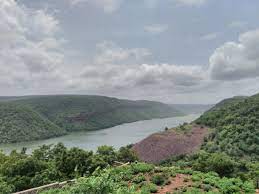CURRENT AFFAIRS
Get the most updated and recent current affair content on Padhaikaro.com
What is Krishna River water dispute?
- IAS NEXT, Lucknow
- 12, Jan 2022

Reference News:
Fearing invectives, both judges on a Supreme Court bench—Justices D Y Chandrachud and A S Bopanna—created a record of sort by recusing from hearing the Krishna river water dispute case just because they hailed from Maharashtra and Karnataka, two litigants in the case apart from Telangana and Andhra Pradesh.
Need for:
Though the judges take oath to render justice without “fear or favour”, apprehensions over insulting or abusive criticism forced their recusal from the Krishna water dispute case.
Dispute in the court:
- Karnataka had sought the vacation of a November 16, 2011, order of the Supreme Court that stopped the Centre from publishing in the Official Gazette (under Section 6(1) of the Inter-State Water Disputes Act of 1956) the final order of the Krishna Water Disputes Tribunal II (KWDT) pronounced in December 2010, allocating the river water to Karnataka, erstwhile Andhra Pradesh and Maharashtra.
- The publication of the tribunal order is a necessary pre-condition for its implementation.
Krishna Water Disputes Tribunal (KWDT) award:
The dispute began with the erstwhile Hyderabad and Mysore states, and later continuing between successors Maharashtra, Karnataka and Andhra Pradesh.
In 1969, the Krishna Water Disputes Tribunal (KWDT) was set up under the Inter-State River Water Dispute Act, 1956, and presented its report in 1973.
The report, which was published in 1976, divided the 2060 TMC (thousand million cubic feet) of Krishna water at 75 per cent dependability into three parts:
- 560 TMC for Maharashtra.
- 700 TMC for Karnataka.
- 800 TMC for Andhra Pradesh.
Revised order:
As new grievances arose between the states, the second KWDT was instituted in 2004.
It delivered its report in 2010, which made allocations of the Krishna water at 65 per cent dependability and for surplus flows as follows:
- 81 TMC for Maharashtra, 177 TMC for Karnataka, and 190 TMC for Andhra Pradesh.
Why the order hasn’t been published yet?
After the creation of Telangana as a separate state in 2014, Andhra Pradesh is asking to include Telangana as a separate party at the KWDT and that the allocation of Krishna waters be reworked among four states, instead of three.
What is Judicial Disqualification or Recusal?
Judicial disqualification, referred to as recusal, is the act of abstaining from participation in an official action such as a legal proceeding due to a conflict of interest of the presiding court official or administrative officer.
Grounds for Recusal:
- The judge is biased in favour of one party, or against another, or that a reasonable objective observer would think he might be.
- Interest in the subject matter, or relationship with someone who is interested in it.
- Background or experience, such as the judge’s prior work as a lawyer.
- Personal knowledge about the parties or the facts of the case.
- Ex parte communications with lawyers or non-lawyers.
- Rulings, comments or conduct.